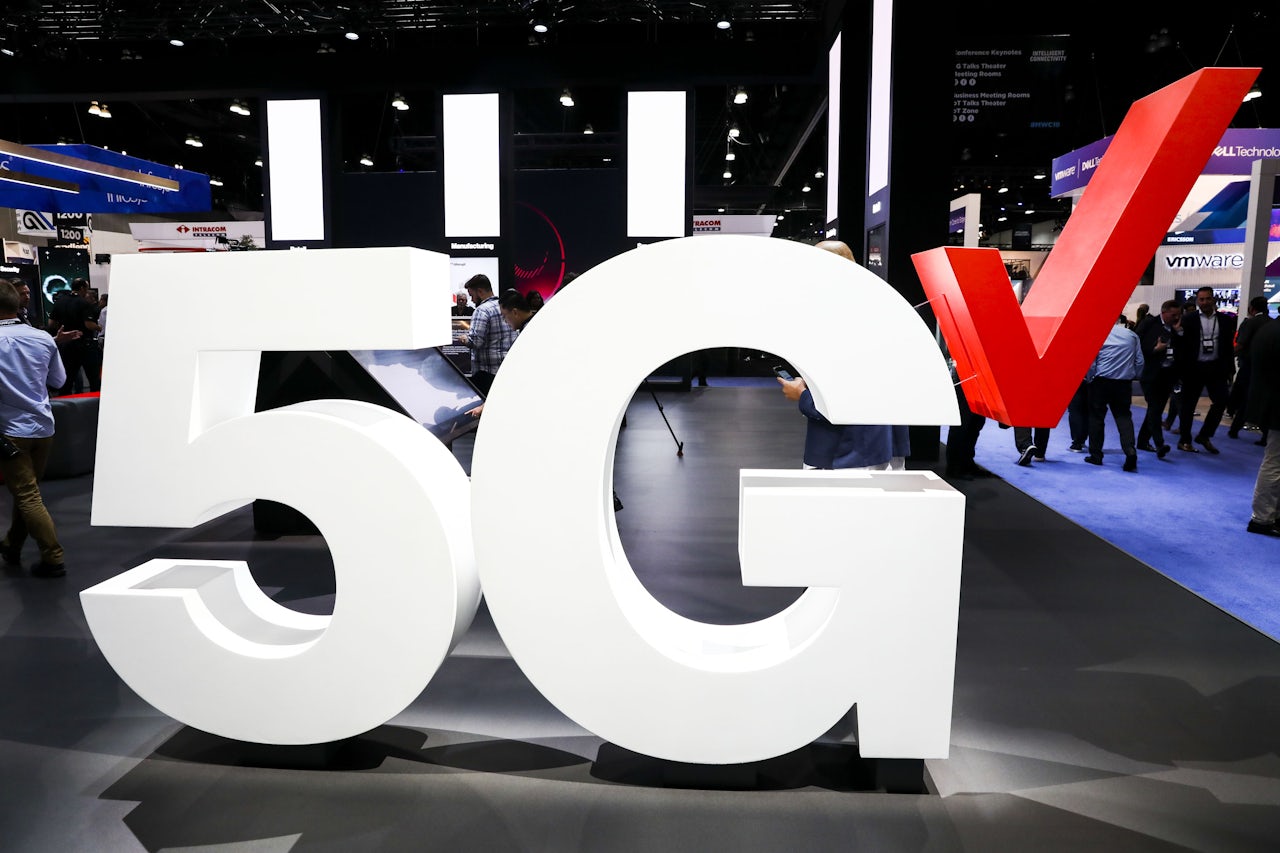One of the big plotlines of the 2020 edition Consumer Electronics Show in Las Vegas, which ended last Friday, was the story of 5G internet. T-Mobile, fresh off its merger with Spring, made a big promise for this year: its own 5G coverage will extend to 200 million customers all across the U.S., and it will offer more than a dozen phones with 5G capabilities (currently there is only one in its lineup). Though AT&T and Verizon haven’t totally spelled out what their own 5G deployment will look like, we’ll likely get a clearer idea of what they’re doing when they report their quarterly earnings later this month.
The premise of 5G is straightforward: it's a higher standard of wireless connection than the one we have now (4G), one that will allow people to send and receive higher volumes of data, and to do it at higher speeds. Although many companies make different parts of the wireless technology used to emit and receive 5G signals, in the U.S., it's the big telecoms who are responsible for rolling it out, as unlike pretty much every other government in the world, we don't have a federal broadband internet policy.
Devoted advocates of 5G internet say that it will change the lives of Americans in substantial ways. Self-driving cars will more easily navigate our cities, virtual reality will become more immersive than ever before, a wider array of devices will be able to connect to the internet, and surgeons may even be able to do their jobs remotely with robots. When big brands talk about the 5G “revolution,” these are kinds of advances that they are talking about. The economic opportunity is often described in terms of potential “trillions of dollars.”
“The industry has not come to terms with a national challenge that dwarfs their limited intent.”
Closer down to earth, the revolutionary qualities of 5G seem a little more prosaic. Most consumers of 5G will experience some more mundane benefits: downloading 4K-quality movies in a matter of seconds, or, if you’re a gamer, less lag. It’s hard to say much more beyond that, particularly because companies have spent many more years hyping the possibilities of 5G instead of actually laying the infrastructure for it. This contradiction between the boring present and the exciting distant future is hard to reconcile; the New York Times this past week advised consumers that the “benefits” of 5G “will probably feel subtle and significant.”
Realistically, these benefits will be felt inequitably, if they are felt at all — a dynamic similar to how these companies rolled out fiber optic internet over the past decade. Ernesto Falcon, an attorney at the Electronic Frontier Foundation, the progressive advocacy group, stressed the pipe-dream quality of the extreme hype around 5G, telling The Outline that “the industry has not come to terms with a national challenge that dwarfs their limited intent.”
Telecoms have traditionally done whatever they can to avoid building expensive infrastructure anywhere besides their most lucrative markets. A Federal Communications Commission report released in 2018 showed that of the most rural 25 percent of Americans, more than 60 percent had no access to high-speed internet providers at all. Laying fiber for internet is an expensive and costly process, and telecoms would rather not have to do in places where they can’t charge the prices they want to; New York City, for example, sued Verizon in 2017 because the conglomerate blew off laying fiber for 1 million people in poorer areas of the city.
Successful 5G wireless networks require highly developed lines of fiber, which means that the entrenched inequalities in fiber distribution will extend to 5G. The telecoms, according to Falcon, “want to be in lucrative markets in major cities, not really low income neighborhoods or rural markets. It’ll be the same thing as broadband so far, targeting the upper half of the income scale.”
To that end, Verizon, T-Mobile, and AT&T are all beefing up the number of 5G-ready devices they offer, and Apple plans to offer its first 5G phone later this year. At the moment, none of the three companies are charging for 5G access in the limited markets they operate already, but that may be because they’re not actually yet offering a 5G-quality experience despite what they claim. AT&T even got caught last year telling customers their phones were getting 5G connections, when they just slapped a “5GE” label on the top of their customers’ phones instead of a 4G.
Which brings me to a point of personal concern. It appears to be the case that the life-changing, epoch-altering promises of 5G — robot surgeons! self-driving cars! — are being used to smuggle in new schemes for long-term telecom profitability. That's not a big surprise, since anyone who's ever head the displeasure of calling the cable guy probably harbors a healthy distrust of these companies' motives.
Because what am I actually going to get from 5G? My iPhone X on 4G LTE service from Verizon loads tweets and YouTube videos terrifically fast, and my calls drop less and less with each passing year. Any improvement to my “speed” or the quality of what I see on my phone would have to be so incremental as to be unnoticeable.
The tradeoff for 5G seems to be something like this: city dwellers like me in a perfectly decent neighborhood with some disposable income get to watch Twitch streams a little more quickly. But millions of Americans go without the infrastructure that even brings them up to my current level, let alone to a 5G standard within the next couple years. That seems like a bad deal, and that’s before we get into the more ominous implications, like the theory that 5G will disrupt our ability to forecast the weather. Just because it can exist does not mean it should, but that hasn’t stopped the tech industry from foisting any number of incremental improvements on a public that’s mostly satisfied with what it has.
